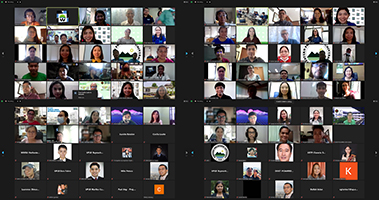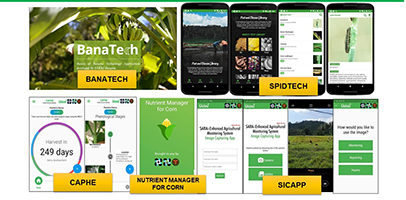 A program aiming for smarter agriculture expands its reach through information and communications technologies (ICTs) and online promotion of products and services.
A program aiming for smarter agriculture expands its reach through information and communications technologies (ICTs) and online promotion of products and services.
The said program titled, “Smarter Approaches to Reinvigorate Agriculture as an Industry (SARAi) in the Philippines-Phase 2” is implemented by the University of the Philippines Los Baños (UPLB), co-implemented by 12 other state universities and colleges (SUCs) nationwide, and funded by the Philippine Council for Agriculture, Aquatic and Natural Resources Research and Development of the Department of Science and Technology (DOST-PCAARRD).
According to Dr. Maria Victoria O. Espaldon, SARAi program leader, the program has organized and conducted 17 series of SARAi Eskwela Webinars; virtual workshop series with the 12 DOST regional offices nationwide to deploy SARAi products and technologies in their respective regions; a two-day virtual research conference, and virtual capacity building activities. They have also participated in radio broadcasts in Radyo CLSU, Bicol Zagitsit 100.3 News FM, Eagle Broadcasting Corp., DZRH, DZLB, and Dream Agritech.
Moreover, Dr. Espaldon reported SARAi’s online decision-support tools for crop risk and agricultural insurance, crop monitoring and forecasting, crop weather advisories, and technical support. These tools can help in developing policies and can aid in decision making.
One of the decision-support tools, the SARAi Knowledge Portal, was discussed by Prof. Concepcion L. Khan, one of SARAi’s project leaders. The portal is an online platform offering a wide range of agricultural information and services in web and mobile formats for its nine priority crops: rice, corn, banana, coconut, sugarcane, coffee, cacao, soybean, and tomato.
Concepcion said that there are web applications deployed and maintained in sarai.ph or sarai.uplb.edu.ph including cropping advisories; interactive maps such as suitability maps, normalized difference vegetation index, rainfall map 30-year dataset, standardized vegetation-temperature ratio, and enhanced vegetation index; national five-month rainfall outlook; 6-day rainfall forecast from automated weather stations (AWS); six-month drought and crop assessment forecast (DCAF); and other services such as SARAi-enhanced agricultural monitoring system (SEAMS), water balance-assisted irrigation decision-support system (WAISS), soil profiling and characterization for 114 sites, and integrated pest and disease management system.
Along with the SARAi Knowledge Portal, Dr. Espaldon also shared SARAi’s web and mobile applications such as SPIDTECH (Smarter Pest and Disease Identification Technology), SARAi Alerts and Advisories, CAPHE (Coffee Application Harvest Estimator), BANATECH (Mobile App to determine harvest date of ‘Lakatan’ & ‘Saba’ bananas), SICAPP (SEAMS Image Capturing Application and Gallery), Rainfall Outlook Mobile Application, SARAi Web Open Drone Map, Planting Date Calculator, Nutrient Manager for Corn, and Automation of Satellite Data Downloading.
These online information services of SARAi can greatly benefit farmers and hopes to result in improved crop yields and climate-resilient livelihoods.
 SARAi has 15 project components classified under three subprograms: 1) Crop characterization, integrated crop management, and model development; 2) Crop-environment monitoring and forecasting; and 3) SARAI mainstreaming and knowledge management.
SARAi has 15 project components classified under three subprograms: 1) Crop characterization, integrated crop management, and model development; 2) Crop-environment monitoring and forecasting; and 3) SARAI mainstreaming and knowledge management.
SARAi technologies and products that are already protected by Intellectual Property Rights include WAISS, SPIDTECH, CAPHE, SARAi Alerts and Advisories, Training Toolkit for Corn, Training Toolkit for Rice, and SEAMS Training Toolkit.
This program is being monitored by PCAARRD’s Agricultural Resources Management Research Division (ARMRD). It has 12 co-implementing state universities and colleges namely, University of the Philippines Diliman (UPD), Bicol University (BU), Central Luzon State University (CLSU), Central Mindanao University (CMU), Cebu Technological University (CTU), Isabela State University (ISU), Mindoro State College of Agriculture and Technology (MinSCAT), Mariano Marcos State University (MMSU), University of Southern Mindanao (USM), University of Science and Technology of Southern Philippines (USTP), Western Philippines University (WPU), and West Visayas State University (WVSU).
